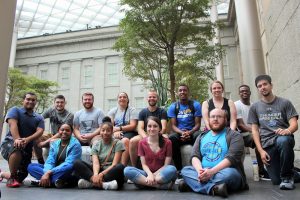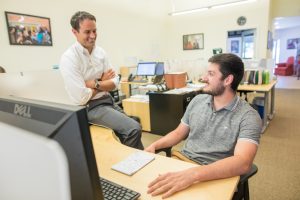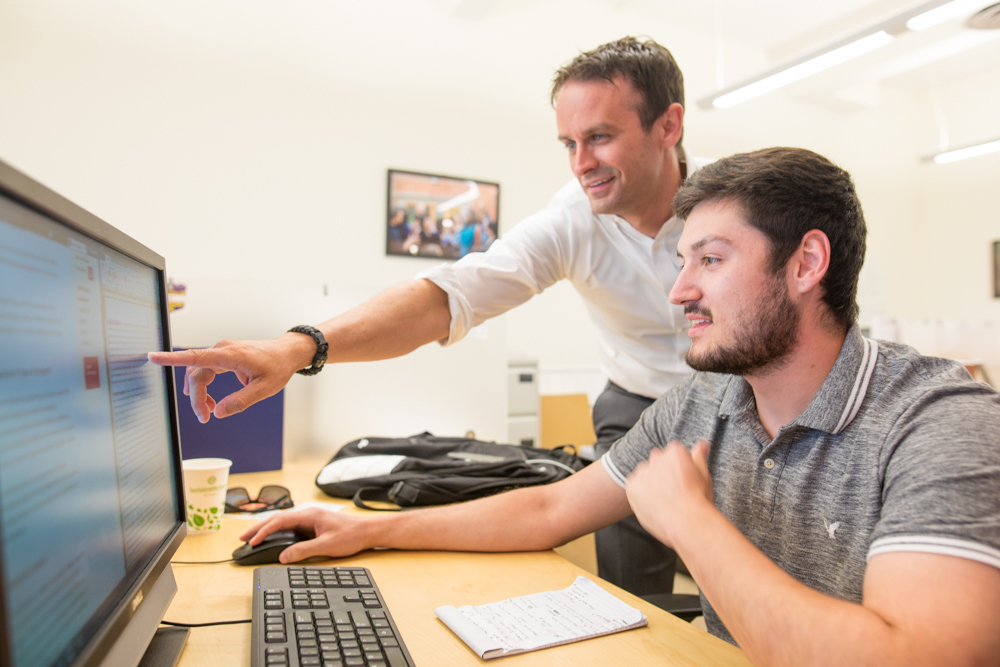The best internship, says Brendon Miller, is crafted jointly and intentionally, incorporating both the goals of the intern and the organization.
Miller would know. His first internship turned into his first full-time job.
Now director of development and communications at Washington Area Community Investment Fund (known as Wacif, pronounced Way-kif), Miller developed a summer project that matched the skills of intern Austin Hart with the organization’s ongoing needs for market analysis.
Hart, a senior business administration and marketing major at Eastern Mennonite University, is the second Washington Community Scholars’ Center (WCSC) student to intern at Wacif.

“Washington D.C. is a great location for business administration, accounting, marketing and related majors to find internships that suit their professional goals,” said WCSC Director Kimberly Schmidt.
This summer, five other students in business-related majors participated in the program:
- Tariq Caldwell, a business administration major with a human resources management minor from Mechanicsville, Virginia, interned with MANNA. He worked in construction project management for the nonprofit affordable housing developer.
- Jazmine Carter, a business administration major with a human resources minor from Fairfax, Virginia, was an assistant in human resources at the headquarters of the YMCA of Metropolitan Washington, helping to prepare presentations and briefings.
- Joshua Ehlers, an accounting and business administration major from Bluffton University and Defiance, Ohio, worked at Bread for the City, a nonprofit that provides financial literacy and education for low-income D.C. residents.
- Jack Leyda, a business administration and accounting major from Atlanta, Georgia, assisted the CFO at Carlos Rosario International School, a public charter school for adults.
- Brianna Zook, a kinesiology and exercise science major with coaching and business administration minors from Harrisonburg, Virginia, interned at Pivot Physical Therapy.
Studies in D.C. public policy connect to students’ home communities
Vocational guidance and career development is one goal of the WCSC program, which provides programming in fall, spring and summer semesters to students from EMU and other partner schools.
Before even arriving in Washington D.C., accepted students develop their resumes, discuss their professional interests, explore possible internship sites remotely and participate in phone interviews – a process aided by Schmidt; Professor Ryan Good, assistant director; and program assistant Karlyn Gehring.
The Nelson Good House in the Brookland neighborhood provides accommodations and communal living space, as well as a classroom where students take academic seminars in urban studies and servant leadership – courses which engage students as empowered citizens and future professionals.
“We use this urban environment to help students critically engage ideas of identity, belonging and displacement,” Good said. “We explore how patterns of inequality and development here in Washington, DC affect local communities — and are connected to issues facing the communities our students call home.”
Gaining market analysis skills

During his time at Wacif, Hart went from knowing very little about grants and funding streams to a growing knowledge about how to analyze opportunities in terms of human resource allocation and the potential benefits to business owners and entrepreneurs served by the organization, which promotes equity and economic opportunity in underserved neighborhoods in Washington D.C.
“We had a specific need for this kind of market analysis to inform our development and community strategy over the next few years,” Miller said. “So in this context, that meant applying set criteria to large amounts of data, identifying potential grants that might fit with our organization, making recommendations and getting past obstacles to look for alternate sources of information.”
Hart’s performance on the large and complex project eventually earned accolades from the organization’s top leadership, Miller said, and an honorary place in the “intern hall of fame.”
For his part, Hart appreciated the opportunity to grow as both a person and a professional, and says that the internship has helped him better visualize what future work environment he can see himself in.
Now as he looks for full-time work, Hart has a resume bolstered by his recent internship.
“I’m hopeful,” he says, “that this experience shows to prospective employers that I can step into a position and be successful.”
